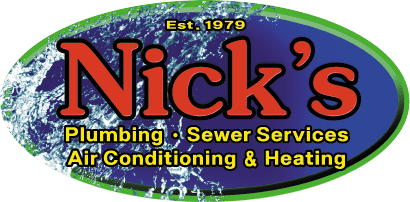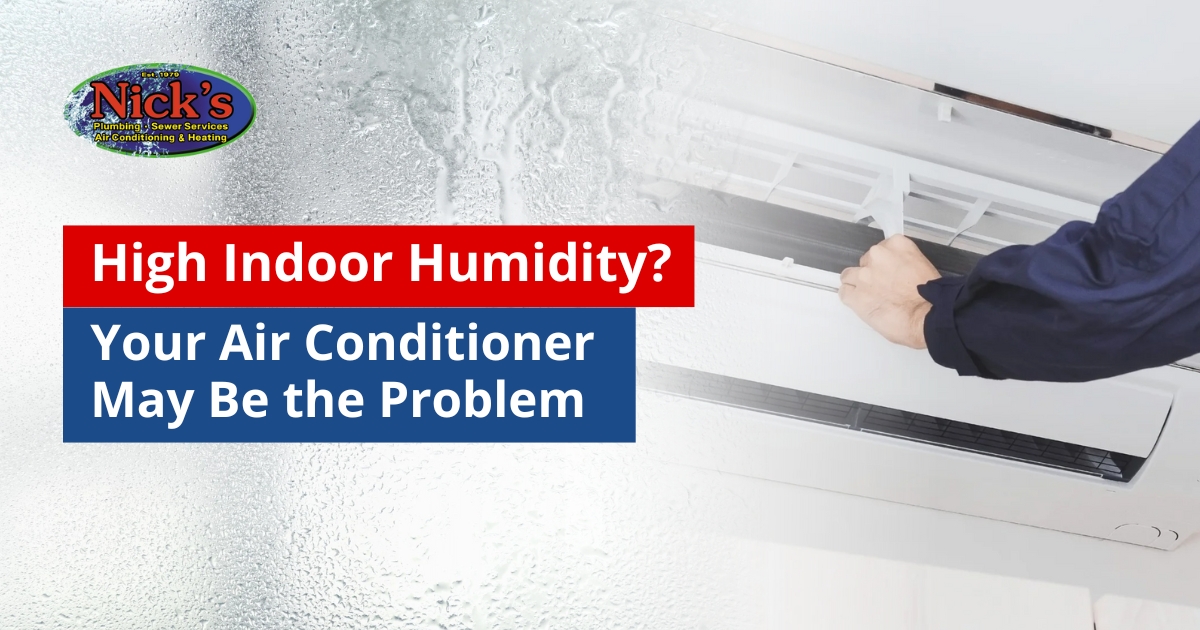Author: Jeff O'Hara
On a typical summer day in Houston, chances are you’ll be on your way home from a long work day. You can’t wait to get into your living room and relax in your comfortable, air-conditioned home. You get to the front door, you turn the knob, and instead of that refreshing cool blast of air you’ve been dreaming of, you walk head-on into a wall of stagnant, sticky, humid haze that’s more akin to a rainforest than the cool, crisp living space you’re accustomed to.
In today’s blog, we’re going to explore why your AC is not removing humidity effectively from your home, what typical symptoms are associated with indoor humidity problems, and what you and your Nick’s Air Conditioning technician can do about solving it!
Why Is My AC Always Running, But My House Still Feels Humid?
The primary job of your air conditioner is to cool the air, but this cannot happen without the process that involves removing as much moisture from the air as possible before the cooling process begins. One reason is that while your system may be cooling the air, it’s not running long enough to pull the moisture out completely.
So, the temperature drops, but what about the humidity?
Still hanging out.
Bottom line, if your home feels more like a swamp than a sanctuary, your AC is not effectively removing humidity from the air, and it’s time to investigate why.
What Should My Home’s Humidity Level Be?
The most comfortable range for indoor humidity is between 25 and 55%; any lower, and you’ll likely experience dry skin and be at higher risk for dehydration.
For humidity levels higher than 55%, you’ll likely feel uncomfortable and clammy. Or sweaty. You’ll feel sweaty.
What Are The Most Common AC Problems That Cause Excess Indoor Humidity?
Oversized Air Conditioning Units
As Texans, we were raised with the belief that everything bigger certainly must be better! Unfortunately, when it comes to controlling humidity and keeping your home comfortably cool, especially during weeks of 100°F temperatures. Or higher.
Sometimes, bigger can definitely be a bad thing.
Why Is Having An “Oversized” Air Conditioner A Bad Thing?
They Cool the Home Too Quickly
Here we have a problem that cleverly disguises itself as a benefit, as who wouldn’t want their home to cool down quickly on a hot day?
The problem is that the oversized AC system blasts out so much cold air at such a rapid rate that the living area reaches the desired temperature before it has had a chance to remove moisture from the air properly. This results in your home feeling cooler, but it still has a damp, sticky feel that makes everyone uncomfortable, all while creating another significant issue for your oversized AC unit.
They Short-Cycle
Now that we know our AC system is cooling the home too quickly, and the AC unit shuts down much sooner than it should. Due to the excess humidity still present in the home’s living areas, the air temperature will start to rise as soon as the AC turns off, causing the AC unit to turn itself back on and blast your home with cold air, while doing nothing to control the humidity. This repeated “short-cycling” doesn’t just waste energy—it also shortens the lifespan of your AC system due to excessive wear, particularly on its electrical and mechanical components.
They Don’t Run Long Enough to Dehumidify
To tackle indoor moisture, your air conditioner needs to run for a considerable amount of time. That extended runtime allows the evaporator coil to do its job—pulling moisture out of the air and sending it down the drain line. Oversized units rarely run long enough for that to happen.
Dirty Air Filters Impede System Airflow
Your air conditioner requires a steady amount of air to be drawn in, cooled, and then expelled through the vents. Because every home has dust, dirt, pet dander, and numerous other airborne particles, it is essential to replace your HVAC system’s air filters on a regular basis.
Even if you choose to maintain nothing else in your HVAC system, please take the time to learn the location, proper size, and orientation of your filter and learn how to do it yourself. HVAC filters are easily accessible and widely available at just about every store. If you aren’t a do-it-yourself type of homeowner, Nick’s Air Conditioning can install your new air filter for you.
Filthy Evaporator Coils Can’t Dehumidify Effectively
When it comes to dehumidifying the air in your home, the most critical component in your HVAC system is the evaporator coil. Your evaporator coil works its magic by both cooling the air and reducing humidity.
When your evaporator coil is covered in dust, dirt, other debris, and moisture, it creates the perfect breeding ground for mold and mildew growth. A dirty evaporator coil can’t correctly drain off the moisture being drawn into the AC unit, causing condensation to accumulate and increase the amount of moisture in the air.
Blocked Drain Lines Are Trapping Dirty Water In Your HVAC System
Clogged AC drain lines cause water that is supposed to exit your home via the condensate line to remain in your HVAC system, potentially backing up into your home. When the condensate line is clogged, the collected water has nowhere to go, and that added trapped moisture will be felt in the house.
If neglected for long enough, a clogged condensate line will cause your AC unit to shut down almost immediately after it starts, either due to
increased pressure or an overflowing drain pan.
Refrigerant Levels That Go Unchecked
A system that is low on refrigerant will not cool or dehumidify as effectively as it should. A licensed and experienced HVAC professional should check refrigerant levels to prevent potential damage to your system. Low refrigerant isn’t usually a symptom that homeowners can spot and measure on their own, as it’s typically discovered during a maintenance service.
Poorly Maintained Air Conditioners Are More Likely To Cause Humidity Issues!
Here, I’m speaking to you as a friend, not just as a blogger. If you skip or ignore the regular annual maintenance of your HVAC system, you’re setting yourself up for potential trouble. Wet, expensive trouble.
And you won’t just feel it as higher humidity; you’ll also face higher electric bills, continually diminishing AC performance, and eventually, the replacement of a five- or seven-year-old system that would have run flawlessly for fifteen years or more.
If only that homeowner had performed regular maintenance.
When Do I Need to Call Nick’s Air Conditioning About My Home’s Humidity Problem?
If you’ve swapped the filter, checked the thermostat, and made sure nothing obvious is blocking airflow, but your house still feels like a sticky mess, it’s time to bring in the experts from Nick’s. Whether it’s an oversized system that’s short-cycling that needs repair, a drain line that’s backed up, or something more serious that requires any major AC replacement or any aspect of your HVAC system, Nick’s can get you back on the fast track to comfort, usually on the same day.
Nick’s has been helping Houston homeowners stay cool and comfortable for over 45 years. Our licensed technicians don’t just treat symptoms—we identify the root of the problem and resolve it correctly the first time. With hundreds of 5-star Google reviews and a decades-long commitment to honest, high-quality service, you can count on us to get your home feeling right again.
If humidity is making your home uncomfortable, don’t wait—let us help you breathe easy again.
Call Nick’s Today. We’re on the Way!


